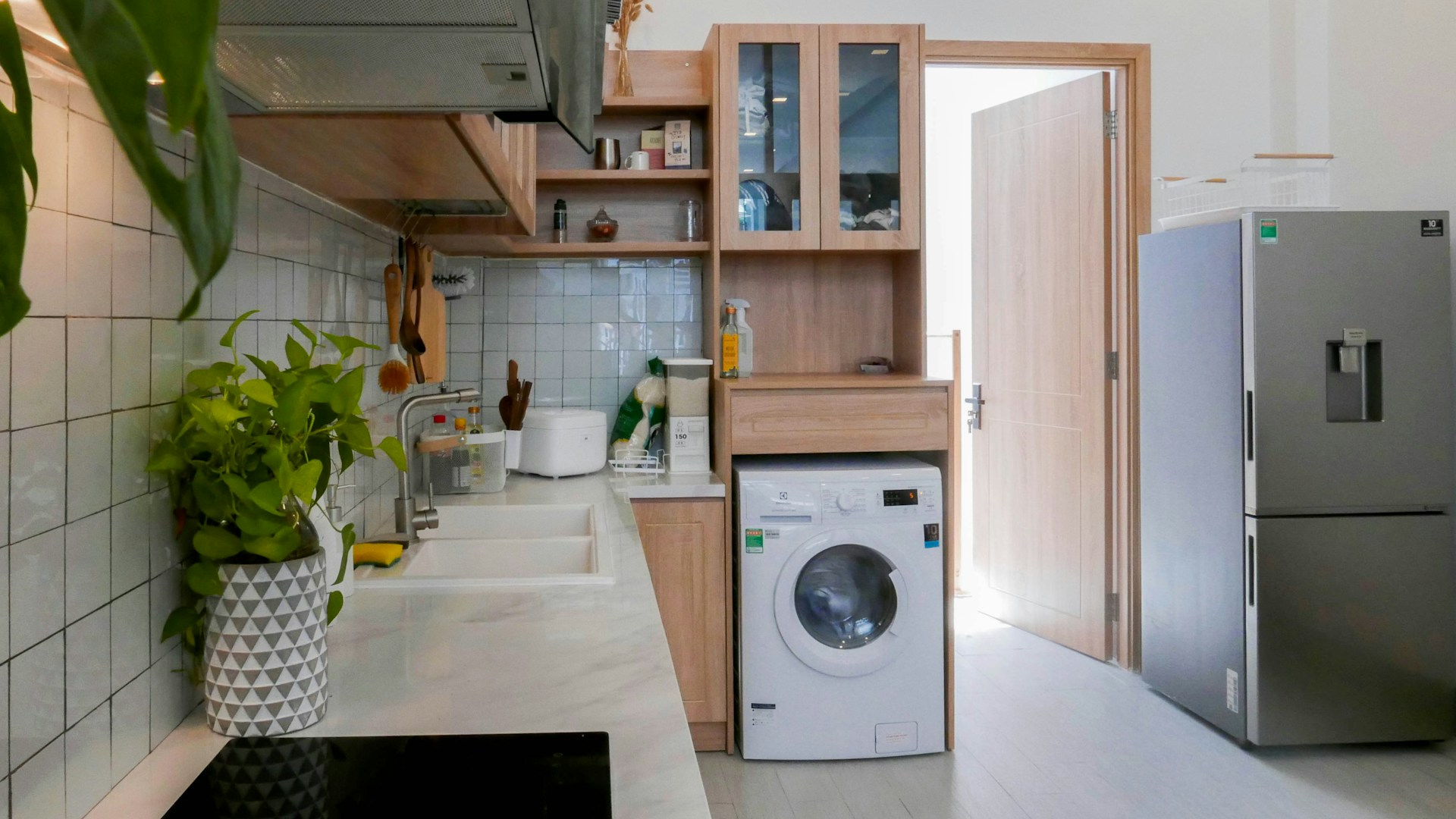
Your home’s appliances work tirelessly behind the scenes, making daily life more convenient and comfortable. From the refrigerator preserving your groceries to the washing machine handling endless loads of laundry, these essential machines deserve more attention than most homeowners give them.
Regular appliance maintenance isn’t just about preventing breakdowns—though that’s certainly important. It’s about maximizing energy efficiency, extending equipment lifespan, and maintaining a well-functioning household.
When you invest time in proper home care, you’re protecting both your budget and your peace of mind. Many homeowners wait until something goes wrong before addressing appliance issues. This reactive approach often leads to expensive repairs, inconvenient breakdowns, and premature replacements.
Smart maintenance, on the other hand, catches problems early and keeps your appliances running at peak performance. This comprehensive approach to appliance maintenance will help you develop routines that protect your investment while reducing long-term costs.
Whether you’re a new homeowner or looking to improve your current maintenance habits, these strategies will transform how you care for your essential household equipment.
Extended Lifespan Means Better Value
Protecting Your Investment
Regular maintenance significantly extends the operational life of your appliances. Most manufacturers design their products to last 10-15 years with proper care, but neglected appliances often fail much sooner.
Simple tasks like cleaning filters, checking seals, and lubricating moving parts can add years to your equipment’s lifespan. Consider your refrigerator’s condenser coils. When these coils accumulate dust and debris, your refrigerator works harder to maintain proper temperatures.
This extra strain shortens the compressor’s life and increases energy consumption. Cleaning these coils every six months takes just 15 minutes, but can extend your refrigerator’s life by several years.
Maintenance Schedules That Work
Different appliances require different maintenance intervals:
- Monthly tasks: Clean dishwasher filters, check washing machine hoses, inspect dryer vents
- Quarterly maintenance: Deep clean refrigerator coils, test smoke detector batteries, and inspect HVAC filters
- Annual service: Professional HVAC tune-ups, water heater inspections, garbage disposal deep cleaning
Documentation and Tracking
Keep detailed records of all maintenance activities. This documentation helps identify patterns, tracks warranty coverage, and provides valuable information when selling your home. Many homeowners use smartphone apps or simple spreadsheets to log maintenance dates and observations.
Energy Efficiency Improvements Save Money
Lower Utility Bills Through Better Performance
Well-maintained appliances consume significantly less energy than their neglected counterparts. A dirty air conditioner filter can increase energy consumption by 15%, while a clogged dryer vent can double drying times. These inefficiencies add up quickly on your monthly utility bills.
Your water heater represents another major opportunity for energy savings. Flushing sediment buildup annually and checking the temperature setting can reduce energy consumption by 10-15%. Similarly, cleaning your oven regularly ensures even heat distribution and reduces cooking times.
Smart Maintenance for Maximum Efficiency
Focus on these high-impact maintenance tasks:
- Clean refrigerator coils: Improves cooling efficiency by up to 25%
- Replace HVAC filters: Maintains proper airflow and reduces strain on the system
- Seal maintenance: Check door gaskets on refrigerators, ovens, and dishwashers
- Calibration checks: Ensure thermostats and temperature controls are accurate
Environmental Benefits
Energy-efficient appliances reduce your home’s carbon footprint. When your appliances operate at peak efficiency, they consume less electricity, reducing demand on power plants. This environmental consideration becomes increasingly important as energy costs rise and environmental awareness grows.
Preventing Costly Emergency Repairs
Early Problem Detection
Regular maintenance allows you to identify potential issues before they become expensive emergencies. Strange noises, unusual odors, or performance changes often indicate developing problems that maintenance can address affordably.
For example, a washing machine that vibrates excessively might simply need leveling or could indicate worn shock absorbers. Addressing this early costs much less than replacing a machine damaged by continued operation with faulty components.
Common Warning Signs
Learn to recognize these early indicators:
- Unusual sounds: Grinding, squealing, or rattling noises
- Performance changes: Longer cycle times, inconsistent temperatures, poor cleaning results
- Physical signs: Rust, corrosion, loose connections, or visible wear
- Energy consumption spikes: Sudden increases in utility usage
Professional vs. DIY Maintenance
While many maintenance tasks suit do-it-yourself approaches, some require professional expertise. Gas appliances, electrical connections, and complex mechanical systems often need professional attention. Know your limits and don’t hesitate to call qualified technicians for specialized maintenance.
Safety Considerations: Keep Families Protected
Fire Prevention Through Proper Maintenance
Appliance-related fires cause thousands of home accidents annually. Many of these incidents stem from poor maintenance practices. Dryer lint buildup, electrical connection issues, and overheating components create serious fire hazards that regular maintenance prevents.
Your dryer vent system requires particular attention. Lint accumulation restricts airflow, causing overheating and potential ignition. Clean the lint trap after every load and have the entire vent system professionally cleaned annually.
Gas Appliance Safety
Gas-powered appliances require special safety considerations. Check connections regularly for leaks, ensure proper ventilation, and replace aged gas lines as recommended. Install gas detectors near gas appliances and replace detector batteries regularly.
Electrical Safety Measures
Inspect electrical cords and connections during routine maintenance. Look for:
- Frayed or damaged cords: Replace immediately to prevent electrical fires
- Loose connections: Tighten connections and clean contact points
- Overloaded circuits: Ensure appliances operate on appropriately sized circuits
- GFCI protection: Verify that ground fault circuit interrupters function properly in wet areas
Seasonal Maintenance Strategies
Spring Preparation
Spring marks an excellent time for comprehensive appliance maintenance. As heating season ends and cooling season approaches, focus on:
- Air conditioning prep: Clean units, replace filters, check refrigerant levels
- Appliance deep cleaning: Detail clean refrigerators, ovens, and other heavily used appliances
- Outdoor equipment: Prepare grills, outdoor refrigerators, and pool equipment
Summer Focus Areas
Hot weather increases strain on cooling appliances. Maintain peak performance through:
- Refrigerator optimization: Clean coils, check door seals, and organize contents for efficient operation
- Air conditioner maintenance: Monitor performance, clean filters monthly, and clear debris from outdoor units
- Ventilation systems: Ensure exhaust fans operate properly to reduce indoor heat buildup
Fall and Winter Preparations
Prepare your home for colder months with targeted maintenance:
- Heating system service: Professional tune-ups ensure safe, efficient operation
- Appliance winterization: Prepare outdoor equipment for storage or winter operation
- Indoor air quality: Replace filters, clean ducts, service humidification systems
Creating Sustainable Maintenance Routines
Building Habits That Stick
Successful appliance maintenance requires consistent routines rather than sporadic intensive efforts. Start with simple tasks and gradually expand your maintenance program as habits develop.
Consider linking maintenance tasks to existing routines. Clean your dishwasher filter when you deep clean your kitchen monthly. Check your dryer vent when you perform other laundry room tasks. These associations help establish sustainable patterns.
Technology and Maintenance
Modern technology simplifies maintenance tracking and scheduling. Smart home devices can monitor appliance performance and alert you to maintenance needs. Smartphone apps help track maintenance schedules and send reminders for upcoming tasks.
Many newer appliances include self-diagnostic features that identify maintenance needs. Learn to interpret these indicators and respond promptly to maintain optimal performance.
Family Involvement
Involve family members in maintenance routines appropriate to their ages and abilities. Children can help with simple tasks like cleaning lint traps or organizing refrigerator contents. This involvement teaches responsibility while distributing maintenance workload.
Create simple checklists for each family member’s maintenance responsibilities. Visual reminders help ensure tasks get completed consistently.
Professional Services and DIY Balance
When to Call Professionals
While many maintenance tasks suit a homeowner’s capability, certain situations require professional expertise. Gas line work, electrical repairs, and complex mechanical issues need qualified technicians. Attempting repairs beyond your skill level risks safety and warranty coverage.
Schedule annual professional inspections for major appliances like HVAC systems, water heaters, and gas appliances. These services often identify potential problems before they cause breakdowns or safety issues.
Building Relationships with Service Providers
Develop relationships with reputable service providers before you need emergency repairs. Research local companies, read reviews, and get recommendations from neighbors. Having trusted professionals available reduces stress when problems occur.
Warranty Considerations
Understand warranty requirements for your appliances. Some warranties require professional maintenance or specific procedures to remain valid. Keep documentation of all maintenance activities to support warranty claims when necessary.
Transform Your Home Care Approach Today
Regular appliance maintenance represents one of the most cost-effective investments homeowners can make. The combination of extended equipment life, improved energy efficiency, and enhanced safety creates tremendous value for relatively modest effort and expense.
Start implementing these maintenance strategies gradually, focusing on your most critical appliances first. As routines develop and you see results, expand your maintenance program to include all household equipment.
This website offers additional resources and detailed guides for specific appliance maintenance procedures.
Remember that consistency matters more than perfection. Regular attention to your appliances prevents most major problems while keeping your home running smoothly. Your future self will thank you for the investment in proper home care and appliance maintenance.
Subscribe To Get Update Latest Blog Post
No Credit Card Required









